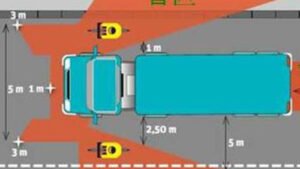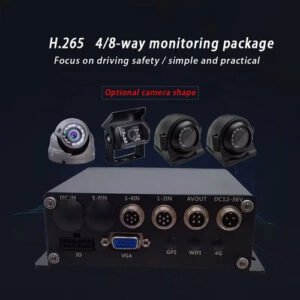Fleet camera solutions have become a cornerstone of modern fleet management, offering unparalleled insights into vehicle operations, driver behavior, and road conditions. These systems combine cutting-edge technologies like AI, GPS, and cloud connectivity to enhance safety, efficiency, and accountability. In this article, we delve into the features, benefits, applications, and future trends of fleet camera solutions, highlighting their transformative impact on the transportation and logistics industries.
What are Fleet Camera Solutions?
Fleet camera solutions are advanced video recording and monitoring systems designed specifically for commercial fleets. These systems typically include front-facing, rear-facing, and cabin cameras that capture real-time video footage of the road, driver, and vehicle interior. Integrated with telematics, GPS tracking, and AI analytics, fleet cameras provide fleet managers with comprehensive insights into vehicle performance and driver behavior.
Key Features of Fleet Camera Solutions
Modern fleet camera solutions are equipped with a wide array of features to meet the diverse needs of fleet operators:
- High-Definition Video: Captures clear footage of the road, vehicle interior, and surrounding environment.
- Dual-Facing Cameras: Monitors both the driver’s actions and the road ahead for comprehensive oversight.
- Event-Based Recording: Automatically saves footage during incidents such as harsh braking, collisions, or sudden acceleration.
- AI-Powered Analytics: Detects risky driving behaviors like distraction, drowsiness, or speeding in real-time.
- GPS Integration: Tracks vehicle location, speed, and routes, providing valuable context to recorded data.
- Live Video Streaming: Enables fleet managers to view real-time footage of their vehicles from anywhere.
- Cloud Storage: Stores video and analytics data securely, allowing for easy retrieval and analysis.
- Night Vision: Infrared technology ensures clear video recording in low-light or nighttime conditions.
- Two-Way Communication: Allows direct interaction between drivers and fleet managers via the camera system.
- Driver Alerts: Provides real-time notifications for unsafe behaviors or potential hazards.
How Fleet Camera Solutions Work
Fleet camera solutions operate as part of an integrated fleet management ecosystem, combining hardware and software for effective monitoring:
- Video Capture: Cameras record high-definition footage of the road, driver, and vehicle interior.
- Data Transmission: Footage and analytics are transmitted to cloud platforms or fleet management software via cellular or Wi-Fi connectivity.
- Real-Time Monitoring: Fleet managers can access live feeds, review recorded footage, and analyze data through a web dashboard or mobile app.
- Event Detection: Sensors detect critical events like collisions, triggering automatic recording and alerts.
- Analysis and Reporting: AI and telematics analyze the data to generate actionable insights and compliance reports.
Benefits of Fleet Camera Solutions
1. Enhanced Driver Safety
Fleet cameras monitor driver behavior and road conditions, providing real-time feedback to prevent accidents and improve safety.
2. Improved Operational Efficiency
By optimizing routes, reducing downtime, and monitoring vehicle performance, fleet camera solutions enhance operational efficiency.
3. Reduced Insurance Costs
Many insurers offer discounts for fleets equipped with advanced camera systems, recognizing their role in reducing accident risks and claims.
4. Evidence for Dispute Resolution
Recorded footage serves as indisputable evidence in case of accidents, disputes, or insurance claims, protecting both drivers and companies.
5. Increased Accountability
Real-time monitoring ensures that drivers adhere to company policies and safety regulations, fostering a culture of accountability.
6. Compliance with Regulations
Fleet camera systems help companies comply with legal and industry standards, such as hours-of-service regulations and vehicle inspection requirements.
Applications of Fleet Camera Solutions
Fleet camera solutions are utilized across various industries to enhance safety, efficiency, and accountability:
1. Logistics and Transportation
Logistics companies use fleet cameras to monitor cargo safety, track delivery routes, and ensure timely deliveries.
2. Public Transport
Buses and taxis employ camera systems to enhance passenger safety and document incidents for resolution.
3. Emergency Services
Ambulances, fire trucks, and police vehicles use fleet cameras for evidence collection and operational review.
4. Construction and Heavy Equipment
Cameras installed in construction vehicles and equipment improve operator visibility and ensure compliance with safety protocols.
5. Ride-Sharing and Delivery Services
Companies like Uber and DoorDash use cameras to ensure driver and passenger safety and resolve disputes effectively.
Future Trends in Fleet Camera Solutions
The evolution of fleet camera solutions is driven by advancements in technology and the growing demand for smarter fleet management tools:
1. AI-Powered Predictive Analytics
Future systems will leverage AI to predict and prevent accidents, offering proactive safety measures.
2. 5G Connectivity
The adoption of 5G networks will enable faster data transmission, supporting real-time monitoring and advanced analytics.
3. Integration with Autonomous Vehicles
Fleet cameras will play a critical role in enabling autonomous driving by providing real-time navigation and obstacle detection.
4. Enhanced Video Quality
Cameras will offer ultra-high-definition resolutions, such as 4K and 8K, for clearer and more detailed recordings.
5. Cloud-Based Ecosystems
Cameras will integrate seamlessly with cloud platforms, offering centralized data management and analysis.
6. Sustainability
Energy-efficient and solar-powered camera systems will support sustainable fleet operations and reduce carbon footprints.
Challenges and Solutions
Despite their benefits, fleet camera solutions face certain challenges:
1. Privacy Concerns
Addressing privacy concerns requires strict adherence to data protection regulations and the use of encrypted storage solutions.
2. High Initial Costs
Advanced camera systems can be expensive, but their long-term benefits in safety and efficiency often outweigh the investment.
3. Maintenance Requirements
Regular maintenance is essential to ensure optimal performance, particularly in harsh environments.
Conclusion
Fleet camera solutions are transforming the transportation and logistics industries by providing unparalleled insights into vehicle operations, driver behavior, and road conditions. These systems enhance safety, improve efficiency, and foster accountability, making them indispensable for modern fleet management. As technology continues to evolve, fleet cameras will become even more sophisticated, offering AI-powered analytics, 5G connectivity, and seamless integration with autonomous systems. Explore the latest fleet camera solutions to unlock their full potential for your business.






